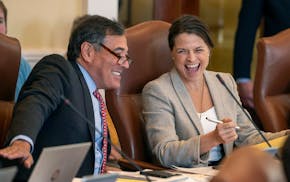Facing a $935 million projected deficit that could grow to $2 billion over the next few years, state officials say that spending cuts are on the way.
"The economy has slowed dramatically," Gov. Tim Pawlenty said Thursday shortly after the state's new economic forecast was released. The state was overspending and would need to reduce, he said, although he added that K-12 schools would be shielded from any reductions.
DFL leaders, who dominate the House and Senate, agreed but said cuts would have to be strategic.
House Speaker Margaret Anderson Kelliher of Minneapolis said that DFLers want to use "a scissors not an ax, so we're not axing Grandma out of the nursing home or axing students and teachers out of classrooms."
Both sides also agreed that a dip into the state's reserves is likely, and Pawlenty said there are "other pots of money rattling around" that the state could tap to soften the blow.
As he has in the past, Pawlenty said that tax increases were a non-starter. "I will not be supporting a tax increase to get revenue into the system," he said.
Minnesota's revenues are down on every major front, from individual income tax receipts to sales tax to corporate income taxes, courtesy of an economy that is slumping nearly across the board.
Complicating any solutions to the budget crisis is the high level of uncertainty in Thursday's forecast.
State economist Tom Stinson said he is skeptical about the prediction of national forecasters Global Insight Inc. that oil prices would fall to $75 per barrel by spring.
Oil prices are now hovering around $100 a barrel. Should the drop fail to occur, he said, the nation could suffer a double-dip recession (a recession followed by a brief recovery, followed by another recession). That could mean further revenue losses in Minnesota.
The $935 million deficit for 2008-09 is projected to grow to $2 billion in fiscal 2010-11 if an inflation rate of 1.9 percent is factored in. Some economic experts believe inflation may rise well beyond that.
In addition, should the housing market decline further, Minnesota could take another hit because the state's economy is closely tied to the housing industry.
Health care is a target
Whether the economy takes any deeper tumbles or not, certain parts of the state's budget already have targets on them. Health and human services are the state's biggest-ticket item, and Pawlenty said that spending there threatens to consume state finances.
"We've got to get a handle on this health-care thing," he said. "It is breaking the backs of Minnesotans."
But health-care advocates say they fear further budget cuts will fall disproportionately on some of the state's most vulnerable populations.
"People with disabilities have taken a lot of cuts in the past," said Bruce Nelson, a provider of services to the disabled. "Any more and we would [be] getting to the core of services that profoundly affect their quality of life."
Much already spent
Two-thirds of the spending for fiscal 2008 is already gone, because funds for schools and local governments are front-loaded.
University of Minnesota President Robert Bruininks didn't hide his concern about the forecast.
"I'm frankly worried about the budget deficit for the rest of the biennium and obviously the projection of continued shortfalls in the following two years," he said.
If appropriations are cut dramatically, one possibility is that students would be asked to make up some of the difference in tuition increases. "I don't want to ask them to pay more," Bruininks said.
Senate Majority Leader Larry Pogemiller, DFL-Minneapolis, said DFLers plan to hold Pawlenty accountable for a budget proposal that solves the state's problems without accounting shifts or big patches of one-time money.
He and Kelliher said they are willing to see how that can be done without raising revenues, but "we want to see something concrete."
Pawlenty, who described the deficit as "serious, but solvable," said his budget recommendations will come next week.
Long-term changes
DFL leaders and Pawlenty said the latest downturn proves the state needs to revisit a tax structure that both sides say is antiquated, but the two sides have very different views of the future.
Pawlenty, who is convening his own tax-reform commission, said the state's upper-income tax and corporate tax rates are among the highest in the nation and are jeopardizing the state's competitiveness. He said the state also lacks any preferential tax treatment for capital gains.
DFLers say the state's tax system is too volatile and regressive and must be restructured with an eye toward restoring stability.
"I invite the governor to get off the roller coaster," Kelliher said. "I cannot imagine this has been an enjoyable ride for him, either."
Pawlenty noted that deficits are also expected this year in most other states.
"The reason for all the declines in revenue is that we're in a recession," Stinson said.
Global Insight predicts the recession will be short and mild, lasting no more than two quarters.
An infusion of cash from Congress' recent passage of a stimulus package is expected to create a bump, Stinson said, but that could fade quickly without a more substantial turnaround.
plopez@startribune.com • 651-222-1288 kduchschere@startribune.com • 612-673-4455
Former Wisconsin Democratic Rep. Peter Barca announces new bid for Congress
The Latest | Jury selection enters a pivotal stretch as Trump's hush money trial resumes

